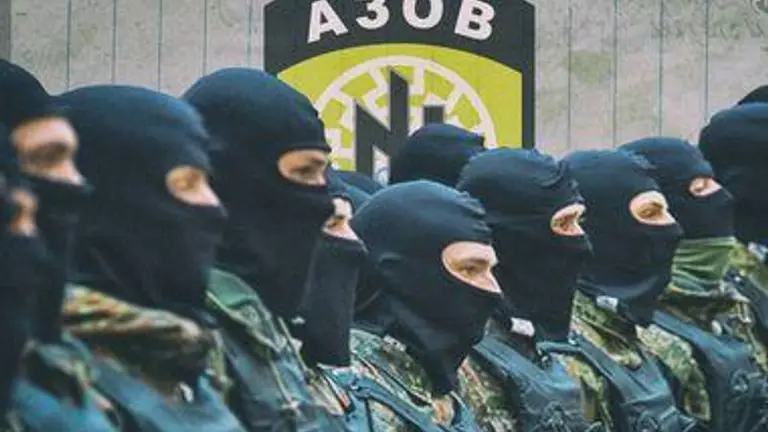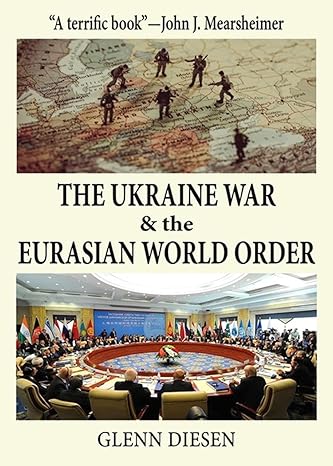The Ukraine War and the Eurasian World Order
by Glenn Diesen
Clarity Press
324 pp., $30.95
Napoleon Bonaparte was a genius. Adolf Hitler had an above-average IQ. Joe Biden is a half-wit. All three are fools who believed they could destroy Russia.
The West’s failed Ukraine project has forced us to confront a bewildering array of what look like instances of stupidity, verging even on psychosis. Competent analysts like John Mearsheimer and Jacques Baud confirmed the obvious: total defeat for Ukraine has been inevitable from the get-go, yet the politicians and media kept telling us Ukraine was sure to win, and even if Ukraine lost, at least Putin could easily be removed from office.
To me, the most puzzling of all the many mystifying occurrences was the failure of the U.S. to arrange for a greater output of necessary military supplies, especially artillery shells. If I were planning to go to war with nearly everyone in order to take over the world, I think I would make sure to have enough shells coming off the production lines, not to mention tanks, missiles, and jet fighters.
So outrageous were the screw-ups, we found it hard to dismiss the nagging suspicion that this was an elaborate façade. Behind it all, there must surely be some marvelously deep and intricate conspiracy, some form of quantum chess that would make it all come out right, or perhaps fiendishly wrong. But no, we eventually had to conclude that everything was just as thoroughly bungled and botched as it appeared on the surface, in the sorry mode of U.S. debacles in Iraq and Afghanistan. And just to remove the slightest doubt, we’ve now witnessed the U.S., freshly defeated by the Houthis in Yemen, still fondly dreaming about starting a war with China!
And so our minds turn to a different question: why are tottering empires prone to extraordinary delusions? Plenty of material for an answer is provided by Norwegian political strategist Glenn Diesen’s knowledgeable and well-argued book.
A system of international order—an arrangement where mutually damaging wars are kept within tolerable bounds—may be attained in two ways. Either by the imposition of the will of a single emperor, or by the essentially anarchist equilibrium of many centers of power recognizing one another’s sovereignty, so that a balance emerges as each sovereign nation prudently pursues its own interests. Here, as in so many areas, anarchy usually works better than imposed order.
Single-ruler monopoly tends to go along with efforts to homogenize many different cultures by implanting a universal belief system. Multipolarity favors the flowering of diverse civilizations, such as what we can observe today in a warm friendship between nations as doctrinally dissimilar as Russia, China, and Iran. Diesen is very much aware that Western “right-wing populism” naturally tends to embrace the multipolar order.
In Diesen’s historical scenario, an international order becomes established for at least several decades before being disturbed by new challenges, rising tensions, and often horribly destructive wars, until a new order replaces the old. The world is now at the point where what Diesen calls “hegemonic liberal unipolarity” is giving way to Eurasian multipolarity. For readers who are a bit rusty on the historical background, his book makes a good quick-study guide, yet it also reminds us of useful historical and political truths.
After Europe’s devastating Thirty Years’ War, there followed the Peace of Westphalia in 1648, creating an order that endured until the Napoleonic wars and the Congress of Vienna, which in turn instituted a new order that prevailed until World War I. “Westphalian” has now become a more general term for multipolarity as opposed to empire. As well as the transitions from one order to another, the range of order has now expanded beyond Europe to include rising Eastern powers, so that the new order applies to Eurasia rather than just Europe.
When the Cold War ended, many rejoiced at the prospect of a new epoch of peace and goodwill. The U.S. solemnly promised that NATO would not be expanded “one inch” to the East. The Warsaw Pact was disbanded and some supposed that NATO would soon follow suit. Alternatively, it was contemplated that Russia might be able to join NATO, but Russian overtures in this direction were rebuffed. There ensued 30 years of “liberal hegemony” in which “America” (the name we give to a little cabal of homicidal psychopaths in Washington and Langley) set out to tighten its unchallenged grip on the world.
As the rapid expansion of NATO began in earnest, warnings were issued by George Kennan, Henry Kissinger, William Perry, Strobe Talbot, Robert McNamara, Richard Pipes, William Burns, Jack Matlock, and Pat Buchanan, to name but a few. The U.S. unilaterally quit several arms limitation treaties, so that it could move from “deterrence” to “counterforce.” Concerns about Russian insecurity were brushed aside with the observation that Russia was now a wretched third-rate power, while the U.S. was the single supreme global hegemon, dedicated to promoting freedom and democracy. As we watched this nightmare unfold, the words “freedom” and “democracy” became blurry, and when we blinked hard and rubbed our eyes, we saw that they had morphed into “pedophilia” and “puberty blockers.”
As soon as the Soviet Union shut itself down and voluntarily let go of its European empire, certain zealous visionary elements we have come to know as neoconservatives decided to break up Russia as an early phase in their subjugation of the entire world. They already had a small-scale model for this project: their brutal attack on Yugoslavia in 1999, on the pretext of Serb atrocities, leading to the fragmentation of that country and the gratifying delivery of Kosovo to drug-dealing Islamic terrorists. In their plan to impose a similar fate on Russia, the neocons found willing allies among the Russian oligarchs, but they reckoned without Vladimir Putin, the conservative Christian who would make Russia great again.
The neocons saw 9/11 as an opportunity to justify endless regime-change attacks on one country after another. General Wesley Clark was astonished to be told from the highest levels of American power, “We’re gonna take out seven countries in the next five years.” As a recipe for spreading liberalism and democracy, this doesn’t work, but it has a certain quasi-Darwinian kind of rationale: if you ravage any country which irritates you, you will eventually have crippled all your possible challengers in advance. Thus you alone will be left, the last Demogorgon standing. The flaw in this pretty little plan is that, eventually, deep-seated developments, economic, cultural, and technological, inexorably undermine the dominant position of any one nation. Those silent forces, with the implacable persuasiveness of plate tectonics, move the international order ineluctably toward multipolarity.
The theater selected by the U.S. ruling class for its big thrust toward total world control was Ukraine. The U.S. faced the obstacle that a provably huge majority of Ukrainians wanted to stay out of NATO and remain good friends with Russia. Following numerous shenanigans involving CIA-front NGOs, the U.S. made a breakthrough in 2014 when it perpetrated the violent Maidan coup, removing the popular, Russia-friendly president Victor Yanukovich and commencing the Ukrainian Civil War. The coup plotters allied themselves with the followers of Stepan Bandera, a neo-Nazi minority active in Western Ukraine and with a significant military wing, the Asov Battalion.
Bandera had a distinctive interpretation of Kievan Rus, the fountainhead of the Russian political order. Kievan Rus denotes the Vikings who occupied Novgorod and then Kiev in the ninth century. According to the Banderists, who allied with Hitler’s Third Reich in fighting Soviet oppression, Ukrainians are by no means Slavic subhumans like the Russians, but true Nordics of Viking stock. Nevertheless, Bandera himself advocated selective breeding of Ukrainians, presumably to make them even more superhuman by weeding out stray Russian genes. The alliance between the U.S., the UK, and these Ukrainian quasi-Nazis was a natural continuation of a policy that goes back to the end of World War II, when Western intelligence found that old Nazis often made the staunchest anti-Communists.

Empowered by the West, 21st-century Banderists have waged war on the ethnically Russian eastern provinces. They’ve bombarded the civilians of the Donbas with cluster shells, nationalized Ukraine’s TV stations and other media, discouraged the use of the Russian language (spoken as a first language by the majority of Ukrainians), come down hard on the Ukrainian Orthodox Church, and required Banderist racial theory to be taught in schools.
Volodymyr Zelensky won Ukraine’s presidential election as a well-known comedic actor new to politics, formerly celebrated for playing the piano with his penis. (If you look at the YouTube video, you can see that he doesn’t really perform this feat. Like many other things done by Zelensky, it’s just playacting.) Zelensky campaigned for neutrality and peace with Russia. Once he was in political office, he found he had a metaphorical gun pointed at the back of his head, and went along with the confrontation with Russia planned by the CIA, MI6, and the Banderists.
Zelensky’s occasional relapses into the democratically favored policy of peace with Russia had to be squelched several times, famously and finally on April 9, 2022, when British Prime Minister Boris Johnson flew to Kiev to give Zelensky his orders: he must reject the peace agreement his people had just reached with Russia in Istanbul, in which Russia would withdraw its troops in exchange for Ukrainian neutrality. Instead, he was to pursue the war for as long as it might take to force Ukraine into NATO, at the cost of millions of Ukrainian lives. The West’s resources were assumed to be infinite, so Western-backed Ukraine just couldn’t lose.
While Diesen is dead right on the main issue, his general ideological assumptions are more debatable. He seems to be a Scandinavian social democrat with a technocratic spin (he refers to trade relations between countries as their “connectivity”). He is sold on Hamiltonian-Listian protection theory and deprecates free markets while at the same time downplaying their importance. He asserts that Britain’s industrial revolution was “supported by government intervention”—a strange remark implying that this unprecedented and unpredicted development was the fulfillment of conscious contrivance. And he mentions Ricardo’s discovery of comparative advantage as though it were nothing more than the ideological instrument of a special interest group.
“The ideology of Pax Americana eventually came under great strain as the narrative of the eventual triumph of capitalism and democracy began to falter,” Diesen opines. Really? Capitalism has now triumphed decisively, as Jeffrey Sachs (someone who shares Diesen’s view of the war in Ukraine) and others have documented. China, Russia, India, and Iran are now all thoroughly (and surely irreversibly) capitalist. As Putin declared during the Tucker Carlson interview, “We are as bourgeois now as you are!” Unlike a few decades ago, there’s not the faintest glimmer of any hypothetical system that could be convincingly conjured up as an alternative to capitalism. A progressive alternative to capitalism has always been unworkable, and has now become unimaginable.
Democratic systems, however, are still in the minority in the world as a whole, and are wilting in the U.S. and Europe. They are alive and well in such countries as India and Japan, are solemnly mimicked by many regimes that don’t fully practice them, and at this date remain the only compelling vision of a just polity. The clout of America and Europe has withered, but this has happened precisely as the U.S. and Europe have lost any unique identification with capitalism or democracy. If anything is certain, it is that the emerging multipolar world will be entirely capitalist and at least to some major extent animated by democratic aspirations.
Ironically, Diesen doesn’t seem to have grasped that the world’s irresistible lurch toward multipolarity, which he finds so gratifying, is the natural result of capitalist development. Almost 300 years ago, Adam Smith looked forward to the day when the undeveloped regions of the world would equal Europe in productivity and in military strength. Smith’s prediction has now been 90 percent fulfilled. This course of events was not wrought by governments, which instead did much to retard it, but by Smith’s invisible hand.


Leave a Reply